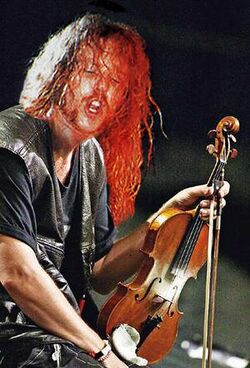Heavy Classical
“I always fill my ballroom, the event is never small.”
Heavy Classical was a genre of music derived from the culturally significant Classical genre and the counterculturally significant Heavy Metal genre. While most found it difficult to understand the connection between the two, Heavy Classical junkies claimed that, once one got past the heavy gain and simplistic shenanigans, Heavy Classical was a very rewarding listening experience rivalling that of true Classical recordings.
Classical music purists were incensed by what they considered a perversion of their favorite genre of music. "By adding their primitive and loud instrumentation, they detract from the texture and beauty of the music." The composers of the songs have not expressed a view on this, as they are all, sadly, deceased.
History
The origin of Heavy Classical music was, and still is, heavily debated and not very well understood. This is primarily due to the controlled substances which were undoubtedly used in the conception of such an idea. While various fan boys have designated Heavy Metal icons Johan Sebastian Bach, James Hetfield, and countless others as the masterminds, a more accepted theory is that renowned conductor Leonard Bernstein is the true father of Heavy Classical. Unfortunately, Bernstein died before Heavy Classical entered the mainstream, and this theory has thus been unsubstantiated.
The first song to ever be played in a Heavy Classical manner was, perhaps unsurprisingly, Beethoven's Fifth Symphony's First Movement. This symphony, well known among people who fancy themselves to be cultured, begins with the instantly recognizable "duh nuh nuh nuhhhhh...duh nuh nuh nnnnnuuuuuhhhhhhh". This recording, which lasted only ten seconds, consisted solely of this excerpt and reached the top of the Billboard charts overnight, where it resided for a solid five weeks. The recording artist is, to this day, disputed as well[1]. Various bands attempted to take claim to it, from Black Sabbath to Nirvana. Though Nirvana was not even a Heavy Metal band, it is generally agreed that they were the artists. Kurt Cobain never commented on this, however, as he felt it would damage the integrity of his music. Though he later killed himself over this line of questioning, Nancy Grace has never expressed remorse.
Popularity
Heavy Classical music became popular among many different demographics. Potheads, crack addicts, and other gross stereotypes of Heavy Metal fans all expressed a certain penchant for the music. They believed it gave them a certain standing in society that would otherwise be impossible due to gross stereotyping. These claims of stereotypes, however, are dismissed as erroneous and made under the influence of every drug known to man. Fucking hippies. Regardless of the sobriety of those people, however, there were other fans of Heavy Classical of less questionable mental capacity.
Though Classical music fans found it abhorrent, many otherwise uncultured people found themselves listening more and more to Heavy Classical as a way of gaining IQ points and attracting those of the opposite gender. "Girls/Boys love a boy/girl that's smart. And anyone who listens to Classical is smart; look at the Asians[2]!" Heavy Classical, thus, became more popular than Rap among the coveted 18-49 demographic, and was therefore exploited by means of advertising to them. Though advertising executives disliked this, as it appealed to "many characters we'd much rather not deal with", nobody seemed to care[3].
Praise and Criticism
Heavy Classical music was lauded for its wide appeal and simple stylistic flairs. For example, throughout Iron Maiden's famous Heavy Classical recording of "Moonlight Sonata, Movement 1," between the guitar crunching out a simplified version of the melody and the lead singer belting out the harmony, one can hear the bassist singing "9 to 5" in the background, albeit off-key and faintly. Most take this as a subtle commentary on the frailty of the working class, represented by the ethereal sound of moonlight. While others pointed out the bassist's then-prominent cocaine addiction as another possible cause, these claims are wrong because...well, they are[3].
Another high-profile criticism came about when ambitious metal band Judas Priest attempted to cover Sergei Rachmaninoff's Prelude in C# Minor. This adventurous move, however, proved to be disastrous. While the recording was enormously successful in every country of the world, in quite a few the release predated the public domain release of the work. An high-profile lawsuit ensued, which brought about many events and changed the course of the world forever. During the suit, the homosexuality of lead singer Rob Halford was revealed, which shook the very foundations of both Heavy Classical music and that of Rock itself. The lawsuit was lost by the band, and they continue to tour to this day just to make up the debt.
Successes and Failures
Over time, it became the tradition to name songs in a pseudo-clever way, so as to falsely inflate the intelligence of the core target audience. These perhaps gag-inducing puns became the industry standard by 1983. In fact, so popular were these names that one could not sell a song without a similarly humorous name. For example, a Heavy Classical recording of "Handel's Water Music" would be called "Handel's Smoke on the Water Music." This example, subtly playing to the audience by mentioning the only success achieved by the band at the time, was the first such name, pioneered by Deep Purple.
Most agree that the biggest failure with this naming scheme was achieved by Van Halen, who, with Dancing the Music of the Night Away, had their last single before lead singer David Lee Roth quit. The song, a play off of Andrew Lloyd Weber's song The Music of the Night from Phantom of the Opera, was a radical change from Van Halen's usually one-trick style. It contained complex counter-melodies and was counterpointed by poignant if understated guitar from Eddie Van Halen. Needless to say, the song completely flopped. Some argue this is why David Lee Roth quit[4], and why Sammy Hagar was chosen as the replacement (he was reportedly enamored with the song[5]).
The biggest success, on the other hand, has proven to be more difficult to agree upon. Some say it was Slayer's classic "The Sleeping Angel of Death (Thep Banthom Maritdtayu)", from the classical Thai song. The diversity of the music's background gave it instant success with hypocrites everywhere, while the simplified melody allowed for those of all levels of intelligence to enjoy it with minimal effort. Others say the uncharacteristically intricate melodies of Metallica's "The Four Wild Horsemen", which played off of Robert Schumann's "Quartet in A Minor", specifically the popular "Wild Horseman" movement. While this seems nonsensical, as Van Halen's endeavor was shot down for intricateness, the popularity of the base song and the general nonsensicalness of the 1980s account for this.
Demise
The arrival of the new millennium, while a source of great hope for conspiracy theorists everywhere, spelled disaster for Heavy Classical. As hip-hop and R & B came to eclipse all other forms of music in popularity, and interest in actual pitched notes began to wane, all Heavy Classical bands were reduced to shadows of their former selves. Distaste at the lack of lyrics in Heavy Classical also became prominent as the increasingly obscene lyrics of popular music became the status quo. The inevitable advancing age of the bands also began taking their toll: people began dying or worse, getting off the drugs, and others left to pursue other endeavors. This general breakup, which seemed insurmountable, was. Heavy Classical died out of the pop culture lexicon by early 2001, and most outside its fan base don't remember it had ever been existent. The worst part, of course, was that no one could blame the fucking hippies anymore.
Footnotes
| Featured version: 10 August 2007 | |
| This article has been featured on the main page. — You can vote for or nominate your favourite articles at Uncyclopedia:VFH. | |


